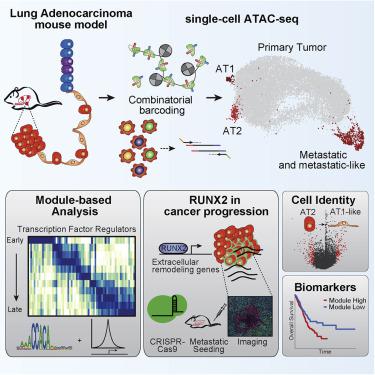Cancer Cell ( IF 50.3 ) Pub Date : 2020-07-23 , DOI: 10.1016/j.ccell.2020.06.006 Lindsay M LaFave 1 , Vinay K Kartha 2 , Sai Ma 3 , Kevin Meli 4 , Isabella Del Priore 4 , Caleb Lareau 5 , Santiago Naranjo 4 , Peter M K Westcott 4 , Fabiana M Duarte 2 , Venkat Sankar 6 , Zachary Chiang 2 , Alison Brack 2 , Travis Law 7 , Haley Hauck 4 , Annalisa Okimoto 4 , Aviv Regev 8 , Jason D Buenrostro 5 , Tyler Jacks 9

|
Regulatory networks that maintain functional, differentiated cell states are often dysregulated in tumor development. Here, we use single-cell epigenomics to profile chromatin state transitions in a mouse model of lung adenocarcinoma (LUAD). We identify an epigenomic continuum representing loss of cellular identity and progression toward a metastatic state. We define co-accessible regulatory programs and infer key activating and repressive chromatin regulators of these cell states. Among these co-accessibility programs, we identify a pre-metastatic transition, characterized by activation of RUNX transcription factors, which mediates extracellular matrix remodeling to promote metastasis and is predictive of survival across human LUAD patients. Together, these results demonstrate the power of single-cell epigenomics to identify regulatory programs to uncover mechanisms and key biomarkers of tumor progression.
中文翻译:

表观基因组状态转变表征小鼠肺腺癌的肿瘤进展。
维持功能性、分化细胞状态的调节网络通常在肿瘤发展中失调。在这里,我们使用单细胞表观基因组学来分析肺腺癌 (LUAD) 小鼠模型中的染色质状态转变。我们确定了一个表观基因组连续体,代表细胞身份的丧失和向转移状态的进展。我们定义了可共同访问的调节程序,并推断出这些细胞状态的关键激活和抑制染色质调节器。在这些共同可及性计划中,我们确定了转移前转变,其特征是 RUNX 转录因子的激活,其介导细胞外基质重塑以促进转移,并预测人类 LUAD 患者的存活率。一起,



























 京公网安备 11010802027423号
京公网安备 11010802027423号